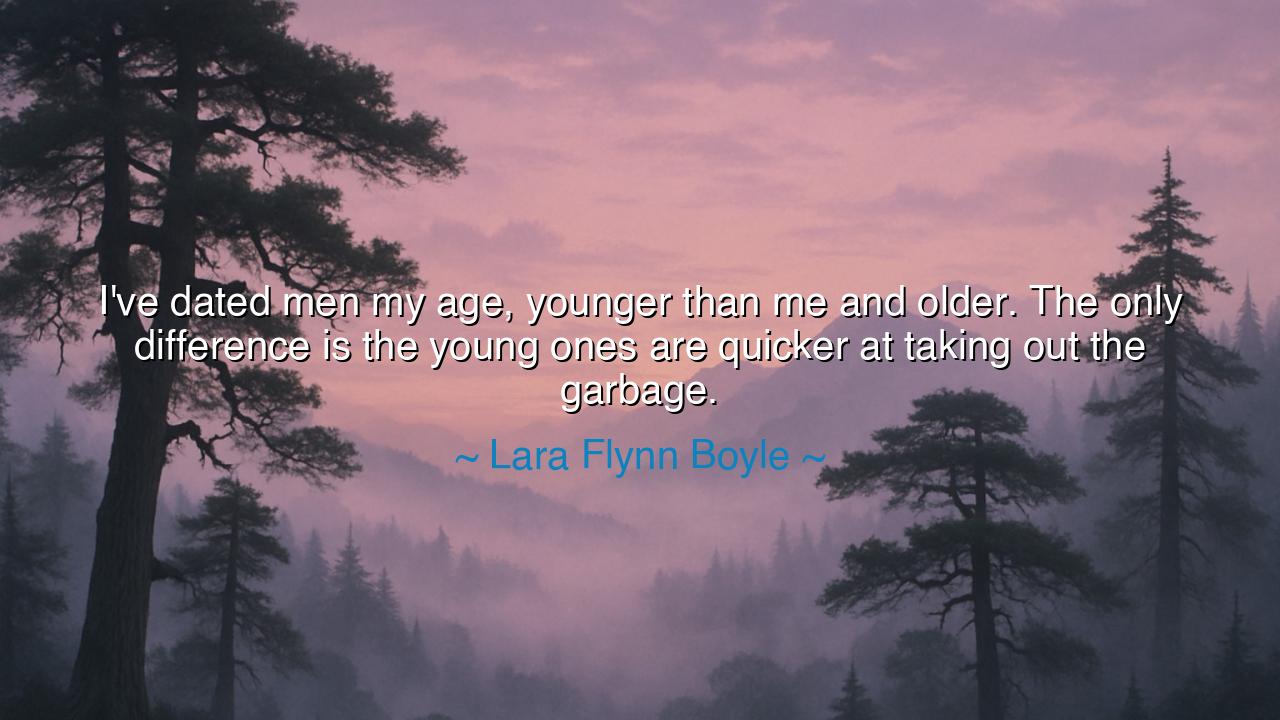
I've dated men my age, younger than me and older. The only
I've dated men my age, younger than me and older. The only difference is the young ones are quicker at taking out the garbage.






When Lara Flynn Boyle said, “I’ve dated men my age, younger than me and older. The only difference is the young ones are quicker at taking out the garbage,” she spoke with the voice of irony — yet hidden within her jest lies the wisdom of experience. Beneath the humor, her words touch upon the eternal mystery of human relationships, the dance between age and vitality, between expectation and reality. Her wit, sharp as a blade, exposes a truth that the ancients too would have understood: that while time may shape the body, the spirit of understanding between people is not born of age, but of character.
At first glance, her words seem merely playful, a teasing remark about the nature of men and youth. Yet, if we listen closely, we hear the undertone of disillusionment and discernment — the realization that maturity does not always come with years, nor does youth always mean shallowness. Boyle’s observation draws upon a universal paradox: that we seek in others the balance between energy and depth, between enthusiasm and wisdom. Her laughter conceals the sigh of one who has looked for harmony among many kinds of hearts and found that human nature, whether young or old, remains bound by its same frailties.
In truth, her “taking out the garbage” is more than the act it describes. It is a symbol — the small acts of care, the gestures of attentiveness, the willingness to help and to serve. Through this simple metaphor, she reveals that what distinguishes people is not age but attitude. The “younger ones” are not better because they are youthful, but because they act — swiftly, willingly, without complaint. They engage in the present, not the past. In the economy of love, such small gestures weigh heavily. For love is not sustained by grand proclamations, but by the daily rhythms of respect, of service, of noticing what needs to be done and doing it with heart.
Her humor, therefore, is the humor of truth wrapped in jest — the kind the ancients revered in their storytellers and philosophers. Diogenes, the Cynic philosopher, once walked through Athens with a lamp in broad daylight, saying he searched for an honest man. Boyle’s wit springs from the same impulse: the search for sincerity in a world that too often hides it. By reducing her wisdom to a quip about “taking out the garbage,” she conceals profound discernment beneath laughter. She has learned that words and promises mean little without action, and that love — whether from youth or age — must prove itself in deeds.
History, too, is filled with tales of such truth. Consider Cleopatra, the Queen of Egypt, who knew both the power of charm and the peril of affection. She, too, drew near to men of all ages — Julius Caesar, the wise and seasoned ruler, and Mark Antony, the fiery warrior of passion. Yet in both, she saw the same truth that Boyle saw in her lovers: that men, whatever their age, are less defined by years than by spirit. Caesar offered intellect; Antony, vitality; but neither brought her peace. For peace, she realized, is not found in the age of one’s partner, but in the mutual recognition of worth — in shared strength, purpose, and respect.
Thus, Boyle’s quote, though wrapped in the tone of lighthearted jest, becomes a modern fable about the nature of partnership. It reminds us that what sustains human connection is not appearance, status, or even experience, but presence — the willingness to engage, to act, to care. The “younger ones” symbolize those who live in motion, who meet life not with resignation but with energy. The “taking out of the garbage” becomes a metaphor for clearing away the clutter of ego, laziness, and indifference — the emotional refuse that often poisons relationships.
And so, O listener, take this teaching to heart: love is not measured by age, but by attention. The true partner, young or old, is the one who acts with mindfulness — who sees what must be done and does it with grace. Do not be deceived by the illusions of time. Youth fades, but care endures. Seek not the one who dazzles with words, but the one who quietly tends the hearth. For in the end, as Lara Flynn Boyle reminds us with a smile, life’s greatest wisdom often hides in the simplest gestures — a helping hand, a willing heart, and a spirit quick to serve.
Thus, the teaching stands: laugh, love, and see clearly. Age may count the years, but love measures the soul. Be swift in kindness, steadfast in respect, and humble enough to take out the garbage — not for applause, but for the quiet harmony that makes life worth living.






AAdministratorAdministrator
Welcome, honored guests. Please leave a comment, we will respond soon